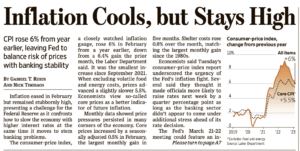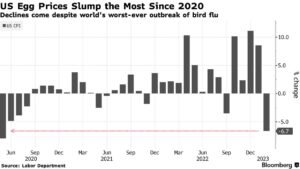Bloomberg's Leah Nylen reported Thursday that "a Colorado judge issued an order temporarily blocking the proposed $25 billion merger of Kroger Co. and Albertsons Cos., which has been challenged by…
Food Prices Rose 0.4% in February, While Eggs Dropped 6.7%- But Eggs Still 55% Higher Than Last Year
Gabriel T. Rubin and Nick Timiraos reported on the front page of Wednesday’s Wall Street Journal that, “Inflation eased in February but remained stubbornly high, presenting a challenge for the Federal Reserve as it confronts how to slow the economy with higher interest rates at the same time it moves to stem banking problems.

“The consumer-price index, a closely watched inflation gauge, rose 6% in February from a year earlier, down from a 6.4% gain the prior month, the Labor Department said. It was the smallest increase since September 2021.”

Associated Press writer Christopher Rugaber reported yesterday at The Washington Post Onine that, “Consumers are getting a bit of relief at the grocery store. Food prices rose 0.3% in February, the smallest monthly gain in nearly two years, though they’re still up more than 10% from a year ago.
“The price of eggs, which have soared 55% from a year earlier, actually dropped 6.7% just in February.”
Following the loss of more than 43 million layers to HPAI during 2022, the monthly average size of the table-#egg laying flock was 310.9 million—about 4.5-percent year-over-year lower. https://t.co/Fmz5vhA4at pic.twitter.com/Fu2vueblLu
— FarmPolicy (@FarmPolicy) March 14, 2023
Bloomberg writers Michael Hirtzer and Leslie Patton reported yesterday that, “Egg prices tumbled for the first time in five months in a long-awaited ease in the cost of the staple food which has been ravaged by the world’s worst-ever outbreak of bird flu.

“Prices fell 6.7% last month, and declines in oranges and bacon will help to make breakfast slightly less expensive in the US, according to Labor Department data released on Tuesday. Eggs recently soared to a record as avian influenza killed tens of millions of birds.”
Weekly average midpoint prices for New York #eggs🥚 (wholesale, large grade A), https://t.co/Fmz5vhA4at pic.twitter.com/8MxYRVjswL
— FarmPolicy (@FarmPolicy) March 14, 2023
Hirtzer and Patton pointed out that, “Still, the CPI index for food increased by 0.4%, compared to a spike of 0.5% in January. That’s as costs for bread, beef, ham and potatoes all rose — contributing to elevated inflation across the American economy. Frozen vegetables are at an all-time high.”
HPAI cases in commercial meat turkeys have slowed in recent months but have not stopped.
— FarmPolicy (@FarmPolicy) March 14, 2023
The most recent cases were in Lancaster, Pennsylvania, and were reported on March 4th, https://t.co/Fmz5vhA4at pic.twitter.com/tfHl45vGq9
“Increased costs are also coming as some Congressional Republicans are seeking to reduce participation in the US food-assistance program as part of efforts to cut domestic spending,” the Bloomberg article said.





